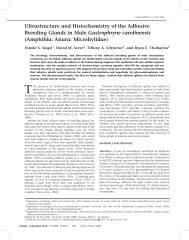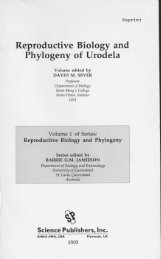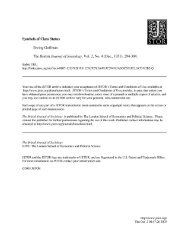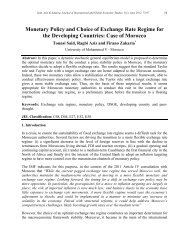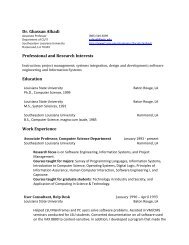Marvelous Facts and Miraculous Evidence in Early Modern Europe ...
Marvelous Facts and Miraculous Evidence in Early Modern Europe ...
Marvelous Facts and Miraculous Evidence in Early Modern Europe ...
You also want an ePaper? Increase the reach of your titles
YUMPU automatically turns print PDFs into web optimized ePapers that Google loves.
96 Lorra<strong>in</strong>e Daston <strong>Facts</strong> <strong>and</strong> <strong>Evidence</strong><br />
human underst<strong>and</strong><strong>in</strong>g. This is why August<strong>in</strong>e parried the objections of<br />
pagan philosophers to Christian miracles like the resurrection by list<strong>in</strong>g<br />
natural wonders-the wood of a certa<strong>in</strong> Egyptian fig tree that s<strong>in</strong>ks rather<br />
than floats, the Persian stone that waxes <strong>and</strong> wanes with the moon, the<br />
<strong>in</strong>corruptible flesh of the dead peacock-that also defied explanation:<br />
"Now let those unbelievers who refuse to accept the div<strong>in</strong>e writ<strong>in</strong>gs give<br />
an explanation of these marvels, if they can."2 However, certa<strong>in</strong> events<br />
deserved to be s<strong>in</strong>gled out from the perpetual wonder of nature as true<br />
miracles because of the message they bore. The miracles of the early<br />
Christian church were of this sort, consolidat<strong>in</strong>g faith <strong>and</strong> unity by a wave<br />
of conversions, <strong>and</strong>, at least <strong>in</strong> later life, August<strong>in</strong>e was also will<strong>in</strong>g to<br />
credit miraculous cures performed by sa<strong>in</strong>tly relics <strong>and</strong> also those performed<br />
on behalf of his side of the Donatist controversy as serv<strong>in</strong>g the<br />
same special ends.3<br />
Aqu<strong>in</strong>as treated miracles with<strong>in</strong> an Aristotelian framework that made<br />
nature considerably more orderly <strong>and</strong> autonomous than August<strong>in</strong>e's profusion<br />
of marvels, ord<strong>in</strong>ary <strong>and</strong> extraord<strong>in</strong>ary, had allowed. Divid<strong>in</strong>g<br />
causes <strong>in</strong>to a higher <strong>and</strong> lower order, Aqu<strong>in</strong>as contended that God's miracles<br />
transgressed only those of the lower order, which exist by God's will,<br />
not by necessity.4 Miracles are of three k<strong>in</strong>ds, <strong>and</strong> each k<strong>in</strong>d admits of<br />
degrees, depend<strong>in</strong>g on how far the ord<strong>in</strong>ary powers of nature are surpassed:<br />
miracles of substance [miracula quoad substantiam] overcome an<br />
absolute impossibility <strong>in</strong> nature (for example, two bodies <strong>in</strong> the same place<br />
at the same time); miracles of subject [miracula quoad subjectum] accomplish<br />
what nature can do, but not <strong>in</strong> that body (for example, speech <strong>in</strong> a<br />
cat); miracles of mode [miracula quoad modum] accomplish what nature<br />
can do <strong>in</strong> that subject, but not by those means (for example, a sudden cure<br />
effected by a holy relic).5<br />
Yet accord<strong>in</strong>g to Aqu<strong>in</strong>as we recognize miracles by their subjective<br />
effect on us rather than by their objective causes:<br />
The word miracle is derived from admiration, which arises when an<br />
effect is manifest, whereas its cause is hidden.... Now the cause of a<br />
manifest effect may be known to one, but unknown to others....: as<br />
an eclipse is to a rustic, but not to an astronomer. Now a miracle is so<br />
called as be<strong>in</strong>g full of wonder; as hav<strong>in</strong>g a cause absolutely hidden<br />
from all: <strong>and</strong> this cause is God. Wherefore those th<strong>in</strong>gs which God<br />
does outside those causes which we know, are called miracles.6<br />
2. Ibid., 7:29.<br />
3. See Peter Brown, August<strong>in</strong>e of Hippo: A Biography (Berkeley, 1967), pp. 413-18.<br />
4. See Thomas Aqu<strong>in</strong>as, Summa theologica, trans. Fathers of the English Dom<strong>in</strong>ican<br />
Prov<strong>in</strong>ce, 3 vols. (New York, 1947), 1: 520.<br />
5. See Aqu<strong>in</strong>as, Summa contra gentiles, trans. English Dom<strong>in</strong>ican Fathers, 4 vols. (Lon-<br />
don, 1928), vol. 3, pt. 2, pp. 60-61.<br />
6. Aqu<strong>in</strong>as, Summa theologica, 1:520.



